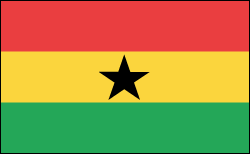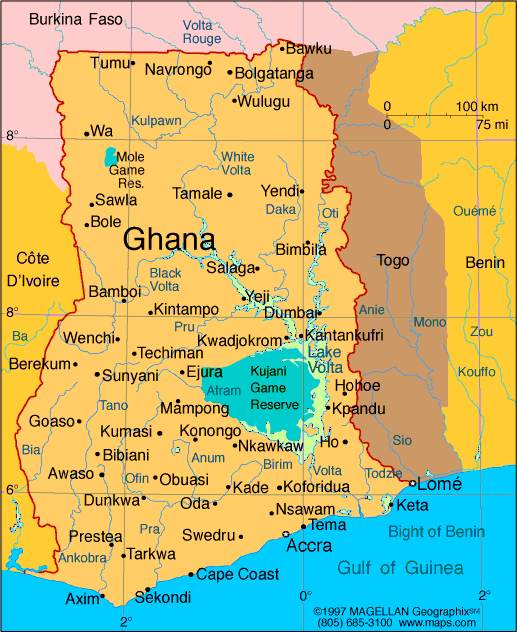GHANA

Geography: A West African country bordering on the Gulf of Guinea, Ghana is bounded by Côte d'Ivoire to the west, Burkina Faso to the north, Togo to the east, and the Atlantic Ocean to the south. It compares in size to Oregon, and its largest river is the Volta.
Government: Constitutional democracy.
History: Several major civilizations flourished in the general region of what is now Ghana. The ancient empire of Ghana (located 500 mi northwest of the contemporary state) reigned until the 13th century. The Akan peoples established the next major civilization, beginning in the 13th century, and then the Ashanti empire flourished in the 18th and 19th centuries.
Called the Gold Coast, the area was first seen by Portuguese traders in 1470. They were followed by the English (1553), the Dutch (1595), and the Swedes (1640). British rule over the Gold Coast began in 1820, but it was not until after quelling the severe resistance of the Ashanti in 1901 that it was firmly established. British Togoland, formerly a colony of Germany, was incorporated into Ghana by referendum in 1956. Created as an independent country on March 6, 1957, Ghana, as the result of a plebiscite, became a republic on July 1, 1960.
Premier Kwame Nkrumah attempted to take leadership of the Pan-African Movement, holding the All-African People's Congress in his capital, Accra, in 1958 and organizing the Union of African States with Guinea and Mali in 1961. But he oriented his country toward the Soviet Union and China and built an autocratic rule over all aspects of Ghanaian life. In Feb. 1966, while Nkrumah was visiting Beijing and Hanoi, he was deposed by a military coup led by Gen. Emmanuel K. Kotoka.

Map of Ghana
President: John Dramani Mahama (2012)
Land area: 88,811 sq mi (230,020 sq km);
total area: 92,456 sq mi (239,460 sq km)
Population (2014 est.): 25,758,108 (growth
rate: 2.19%); birth rate: 31.4/1000; infant mortality rate: 38.52/1000;
life expectancy: 65.75
Capital and largest city (2011 est.):
Accra, 2.573 million
Other large cities:
Kumasi, 2.019 million (2011)
Monetary
unit: Cedi
Languages:
Asante 14.8%, Ewe 12.7%, Fante 9.9%, Boron (Brong) 4.6%,
Dagomba 4.3%, Dangme 4.3%, Dagarte (Dagaba) 3.7%, Akyem 3.4%, Ga 3.4%,
Akuapem 2.9%, other (includes English (official)) 36.1% (2000 census)
Ethnicity/race:
Akan 47.5%, Mole-Dagbon 16.6%, Ewe 13.9%, Ga-Dangme 7.4%,
Gurma 5.7%, Guan 3.7%, Grusi 2.5%, Mande-Busanga 1.1%, other 1.6% (2010
census)
Religions:
Christian 71.2% (Pentecostal/Charismatic 28.3%,
Protestant 18.4%, Catholic 13.1%, other 11.4%), Muslim 17.6%,
traditional 5.2%, other 0.8%, none 5.2% (2010 census)
National Holiday:
Independence Day, March 6
Literacy rate: 71.5% (2010 est.)
Economic summary: GDP/PPP (2013 est.):
$90.41 billion; per capita $3,500. Real growth rate: 7.9%.
Inflation: 11%. Unemployment: 11% (2000 est.).
Arable land: 20.12%. Agriculture: cocoa, rice, coffee,
cassava (tapioca), peanuts, corn, shea nuts, bananas; timber. Labor
force: 12.07 million (2013 est.); agriculture 56%, industry 15%,
services 29% (2005 est.). Industries: mining, lumbering, light
manufacturing, aluminum smelting, food processing, cement, small
commercial ship building. Natural resources: gold, timber,
industrial diamonds, bauxite, manganese, fish, rubber, hydropower,
petroleum, silver, salt, limestone. Exports: $13.37 billion
(2013 est.): oil, gold, cocoa, timber, tuna, bauxite, aluminum,
manganese ore, diamonds. Imports: $14.03 billion (2011
est.): capital equipment, petroleum, foodstuffs. Major trading
partners: Netherlands, Italy, UK, France, Germany, U.S., India, Singapore, Nigeria, China (2012).
Member of Commonwealth of Nations
Communications: Telephones: main
lines in use: 285,000 (2012); mobile cellular: 25.618 million (2012).
Broadcast media: state-owned TV station, 2
state-owned radio networks; several privately-owned TV stations and a
large number of privately-owned radio stations; transmissions of
multiple international broadcasters are accessible; several cable and
satellite TV subscription services are obtainable (2007). Internet hosts:
59,086 (2012). Internet users: 1.297 million (2009).
Transportation: Railways: total: 947 km
(2008). Highways: total: 109,515 km; paved: 9,955 km; unpaved:
52,266 km (2009). Waterways: 1,293 km; note: 168 km for
launches and lighters on Volta, Ankobra, and Tano rivers; 1,125 km of
arterial and feeder waterways on Lake Volta (2011). Ports and
harbors: Takoradi, Tema. Airports: 10 (2013).
International disputes: disputed maritime border between Ghana and Côte d'Ivoire.
-------------------- o --------------------
No comments:
Post a Comment